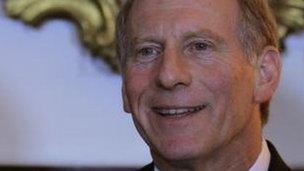Richard Haass meets Northern Ireland Executive parties
- Published

Richard Haass held further talks in Belfast on Friday
Dr Richard Haass has met the five parties in the Northern Ireland Executive for a further round of talks.
The former US envoy is chairing talks on flags, parading and dealing with the past - areas that have proven difficult for the NI parties to resolve.
Afterwards, Mr Haass said he continued "to believe that there is a good chance of achieving meaningful progress".
He said the talks would "enter a new phase starting in two weeks when we return" (to Northern Ireland).
"It will become much more a negotiating phase rather than just a consultative phase," he said.
"That's when the rubber meets the road, when people have to decide if they are prepared to support this or that proposal, or this or that language.
"That's when we'll find out exactly what the willingness and ability, because it's both, to compromise actually is."
Dr Haass said he believed progress could be made "because of what I take, in an admittedly informal way, as the mood of the society; it's also from the content and tenor of the conversations with the political leadership here and it's a confidence that's derived from my conversations with the British government and the Irish government".
He added: "The parties themselves, I get the sense, are taking it seriously.
"I haven't heard anything yet, or read anything yet that leads me to think that in any way we are wasting our time."
He said the goal of the talks was to facilitate a conversation between the representatives of the five main parties and help them reach consensus on each of the three issues.
400 submissions
The five executive parties all agreed that Friday's meeting was positive, and that progress had been made, but that the real difficult negotiations were still to come.
It emerged that about 400 submissions had been received from the public and that bilateral meetings between the parties were already taking place and would continue outside of the process.
Jeffrey Donaldson of the DUP said: "We remain hopeful. We don't underestimate the challenge we face here, particularly in dealing with the legacy of the past.
"Any process to deal with the past has to be victim centred, we are absolutely clear about that. Anyone who has observed the debates that have taken place over the last couple of weeks will recognise just how raw the emotions still are, how deep the feelings and the hurt and the sense of loss still is.
"I think we need to approach these issues sensitively but we are very clear we want to see progress being made."
'No silver bullet'
Sinn Fein's Gerry Kelly said he was more optimistic than when talks started, and that the number of submissions received by the Haass team made it "a people's process".
He added: "I'm happy with the process as it has gone now. The devil I think, as Richard Haass has said, is in the detail, we all know that, but let's get into that detail and see what we can do.
"It is up to the politicians to make this work, that's why we are on the panel. Richard Haass has no silver bullet, and neither have we.
"I'm very aware of raising expectations, but I think in this process we should have expectations and the expectations are of us, and I think we need to live up to that."
'Get the mess sorted'
SDLP MLA Alex Attwood said all the parties were "beginning to hear and heed the voices from outside the talks room" that are asking politicians to "get the mess sorted out".
He said: "We all now have to engage even more positively with Richard Haass, and the parties themselves have to talk together much more in order to see whether we can have a breakthrough or whether we'll end up with a breakdown."
Tom Elliott of the UUP said that expectations have to be kept in check.
"You always have to go into these processes hopeful, you need to go in with a positive attitude, but I do think people need to be realistic and accept that these aren't easy," he said.
"They are all very difficult issues that we're dealing with. The real negotiations haven't yet commenced, we're talking about processes at the moment, and when we get into the real negotiations we'll have a much better sense of where we're going."
Alliance MP Naomi Long said: "The responsibility for the success or failure of this process rests not with Richard Haass, who is there to chair the meetings, but with the political parties who are gathered at the table. It's our responsibility to find solutions and that's where our focus has to be."
- Published31 October 2013
- Published29 October 2013
- Published17 September 2013
- Published20 September 2013
- Published1 October 2013